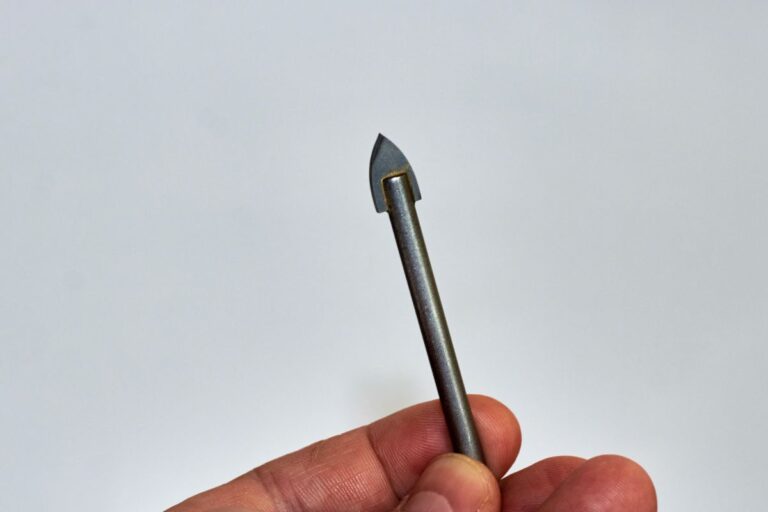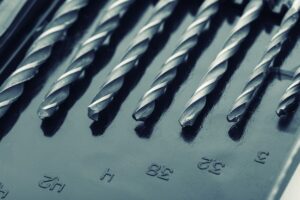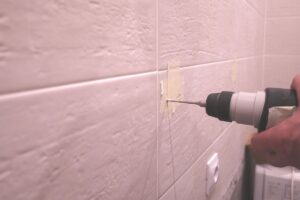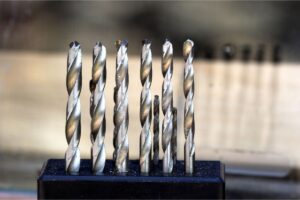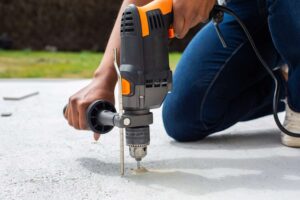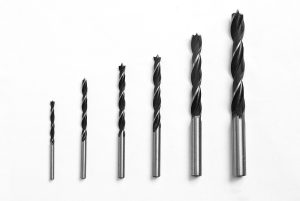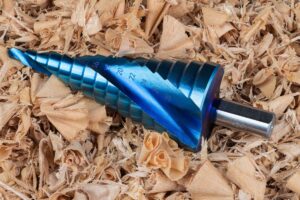There are numerous reasons why you should be drilling through a ceramic tile. They’re one of the most common types of tile you need to drill through, but you may be wondering what kind of drill bits you need to prevent it from cracking.
To help, we’ve compiled this helpful guide to find the best drill bits you need to drill through ceramic tile without damaging it.
Let’s say that you’re working on a kitchen or bathroom renovation. What sort of drill bit would you need? After all, you don’t want a drill bit that can damage the tile, or else you’ll have more costs finding a replacement tile.

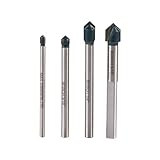








Table of Contents
What Type Of Drill Bit Should You Look For?
Drill bits are made from different materials, so it’s essential that you find one that works for the material that you want to drill through.
In this scenario, we’ll be drilling through ceramic, which is why we suggest looking for a carbide-tipped masonry drill bit. However, you could also use a diamond-tipped drill bit, which can drill through even the hardest surfaces.
Ideally, diamond-tipped drill bits are better suited for drilling through porcelain as it’s a much harder material.
On the other hand, carbide-tipped masonry drill bits are the most popular choice for anyone who needs to drill through ceramic, whether it’s a glazed tile or stoneware.
With this in mind, let’s go through the different types of drill bits that are best recommended for drilling through our ceramic tiles.
Best Ceramic Tile Drill Bit
QWORK 5-Piece Multi-Material Tungsten Carbide Drill Bits
Made from Carbide with a 3-flat shank, QWORK has produced a five-piece drill bit set, which has been specifically designed for drilling holes into bathroom tiles.
The pointed spear ensures that it can penetrate various materials, including ceramic, concrete, brick, glass, plastic, and even wood. It comes in four different sizes and has a U-type slot design to remove any drilling dust.
There are multiple sets available, with the 5-piece set being the most popular, but you can also invest in a 6-piece, 8-piece, and two different types of 10-piece sets.
It has been praised for its accuracy and versatility, with the shank flats providing an excellent grip that keeps each bit steady in the drill. However, we wouldn’t recommend these for porcelain tiles.
We should also note that there have been some issues with quality control before, but otherwise, it has been an excellent and popular choice for many.
Pros
- Versatile — Can be used on a wide range of materials.
- Accurate — The drill bit’s point doesn’t wander, ensuring pinpoint accuracy.
- Good Grip — It’s easy to hold onto and remains steady when you use it.
Cons
- Quality Control — There have been reports that it has had some issues with quality.
- Not Suited For Porcelain — It does work for ceramic tiles, but it rarely works on porcelain tiles, as they will break them.
BOSCH GT2000 4-Piece Carbide Tipped Drill Bit Set
The BOSCH GT2000 drill bit set is made of carbide and is oxide coated with a 3-flat shank. This 4-piece set is perfect for anyone who wants to drill into either glass or ceramic tile and has been designed to reduce any cracks.
The 3-flat shank provides an excellent grip which ensures that it won’t slip from your drill, and is known for its speed.
There are multiple sets available, with the 4-piece set being the most popular, but drill bits can also be bought in individual sizes or as part of an 8-piece set. The precision tip provides excellent accuracy, and the 3-flat shank ensures a comfortable grip when drilling.
There’s no doubt that it is a versatile choice and can be used for glass cutting, bathroom installations, and so much more. However, it’s important to note that these will not work on porcelain and may require some patience when used for larger projects.
Pros
- Versatile — The BOSCH GT2000 can be used on various types of materials.
- Good Grip — Due to the 3-flat shank, the drill bit remains lodged in the drill and ensures a good grip.
- Accurate — The drill bit’s point doesn’t wander and ensures pinpoint accuracy.
Cons
- Not Suited for Porcelain — These drill bits won’t work on porcelain and will most likely break the plate.
- Speed — Some customers have reported that these drill bits are quite slow, especially when used on a larger project, so they may require patience when used.
DUNCHATY 15-Piece Diamond-Tipped Drill Bit Set
The DUNCHATY 15-piece drill bit set is designed to work on a wide variety of materials, including ceramic, glass, and porcelain.
These drill bits are made with diamond and steel, with a nickel-plated coat on the body to prevent corrosion. They work on a wide variety of drills, and are versatile in how you can use them.
There are plenty of drill bits in the package for an affordable price. However, we have found that some customers have had issues with quality, and they had a more unsteady grip than others.
Yet, if you do want to drill through the porcelain, then these are an excellent choice due to the materials used to make them.
Pros
- Versatile — These drill bits can be used on a wide range of materials, including ceramic.
- Suitable for Porcelain — They can drill through porcelain without breaking the material.
- Affordable — For diamond drill bits, these offer an affordable choice when you need to drill through harder materials.
Cons
- Durability — Some customers have complained about the quality of these drill bits and have noted that some haven’t been very durable.
- Unsteady Grip — There have been some reports that they have been wobbly when used and so can be difficult to grip.
COMOWARE 7-Piece Carbon Steel Carbide Tip Drill Bits
The 7-piece COMOWARE drill bits made from carbon steel and have a carbide trip are perfect for ceramic tiles. They’re made from industrial-grade materials and are resistant to rust.
They have an upgraded design that ensures they can drill through dust and debris. By having a spiral shank, these drill bits can cut fast on thin materials and are also accurate.
Overall, the COMOWARE 7-piece drill bit set is a versatile choice as it works for a wide range of materials, including ceramic and glass, but it is unsuitable for porcelain.
While it has been praised for its accuracy and durability, it has also been noted by some customers to have an unsteady grip. However, it is an excellent choice for someone looking for a drill bit to use on ceramic tiles.
Pros
- Durability — Due to the materials used, including carbon steel, it has been praised for its durability.
- Versatile — These can be used on a wide range of materials but may not be suitable for significant heavy-duty work.
- Accurate — Many customers have praised its accuracy.
Cons
- Unsteady Grip — Some customers have reported that it wobbles and thus provides an unsteady grip.
- Not Suitable for Porcelain — While it is suitable for ceramic, it isn’t suitable for drilling into porcelain.
DKIBBITH 10-Piece Carbide Tipped Drill Bits
The 10-piece DKIBBITH carbide tipped drill set is made from a combination of aluminum, stainless steel, and iron, with a carbide tip. It has been designed for durability, and has a U-type slot design to ensure that it works quickly and removes any debris.
It also has an anti-slip triangle shank which ensures that it will fit tightly and is suitable for a wide range of drills. It is also versatile, and will work on a wide range of materials, including ceramic tile.
When it comes to the DKIBBITH 10-piece drill bits, we’ve found that they are versatile and can drill through a wide range of materials for an affordable price.
However, with the affordable price tag, it does come with an increased amount of mixed reviews about the durability of these tools. However, many customers have praised the accuracy of these drill bits, but it would be wise not to use them on porcelain tiles.
Pros
- Versatile — These drill bits can be used on a wide range of different materials, including ceramic tiles and glass.
- Affordable — These drill bits are available for an affordable price and work with a wide range of electric drills.
- Accurate — Many customers have praised the accuracy of these drill bits, and they don’t crack the ceramics.
Cons
- Durability — There have been mixed reviews regarding the durability of these tools.
- Not Suitable for Porcelain — While these drill bits work on a variety of materials, they are not suitable for porcelain tiles.
Buyer’s Guide
To help you understand how we came up with our decisions for the best ceramic tiles, we’ll take a look at what we took into account.
We’ll explain our decisions to you, and how our thought process can help you to decide which of these drill bits are most suitable for ceramic tiles.
Versatility
When we analyzed the drill bits used, we considered how versatile they are. In terms of versatility, we checked whether these drill bits could work on ceramic, glass, and other materials.
If we wanted to see how these drill bits would work on a wide range of materials, we would include this as part of our selection process.
Accuracy
One of the essential components of deciding whether the drill bits were rated highly was by how accurate they were.
We understand that when drilling a hole into any material, we wouldn’t want the material to crack. With that in mind, we considered how these drill bits worked when used in practice.
Affordability
We included the affordability of certain products as we find that sometimes the best don’t have to be the most expensive.
In many cases, price and affordability are deciding factors, so we thought that it would be best to include whether it was expensive or not. However, we also believe that this would explain other factors.
Grip
When we use a drill, we need to consider how well the drill bits grip the actual drill.
When the drill bits don’t grip correctly, it makes the drill more unsteady, and thus impacts the accuracy. Therefore, if it has reports of wobbling from other customers, we need to consider whether this is a general problem it has, or whether it’s a rare occurrence.
Overall, it needs to be mentioned, as this can impact our overall rating of the drill.
Speed
If you want a quick job done, we need to consider whether the drill will allow for that, and if it drills through the ceramic tile quickly.
The speed can be a deciding factor for many customers, who may need to drill small holes in the ceramics quickly.
Some drill bits may require more than one attempt at drilling, which can take more time. Therefore, we need to consider this when deciding the best drills.
Quality Control
Another deciding factor is the quality control of each drill bit. If there have been some complaints about the quality of the drill bits, we need to consider them when writing.
We don’t want to suggest any drill bits that have a high degree of quality control issues. However, this shouldn’t be confused with the durability of each drill bit, as we will cover below.
Durability
The durability of a different drill bit is different from quality control, as a drill bit can still be high quality but have a low durability.
If a drill bit is low quality, it will simply break. While the durability is related to the longevity of a product and how well it will drill. Therefore, we have classed these two separately.
If you are looking for a long-lasting piece of equipment, we have considered whether you will find it with some of these tools.
Suitability For Porcelain
One factor that definitely needs to be considered is whether the drill bit will have an effect on porcelain tiles.
There are many customers who have bought these drill bits and assumed that they would work on porcelain tiles, however, these are more difficult to drill through.
Porcelain cracks easily, and requires a diamond-tipped drill bit, and should not be attempted with a carbide-tipped drill bit.
Frequently Asked Questions
How Do You Drill Through Ceramic Tile?
Drilling through ceramic tile is a daunting task when you are unfamiliar with the correct techniques. Plus it can be totally different from drilling into concrete. Therefore, we recommend that the first thing you do is purchase the correct drill bit: such as carbide-tipped or diamond-tipped drill bits.
You should put tape on where you want to drill, and dip the drill bit into water to ensure that it doesn’t get too hot.
Then, drill closer to the center of the tile to ensure that you won’t crack the material. It’s better to drill slowly, and then speed up at the end. That way, the drill itself won’t overheat either.
Do You Need A Special Drill Bit For Ceramic Tiles?
Ideally, it’s better to use a carbide-tipped or diamond-tipped drill bit to ensure that it penetrates the hard ceramic material.
Do You Drill Through A Tile Quickly Or Slowly?
Depending on the product you’re drilling through, it’s better to drill slowly when you are drilling through a ceramic tile. If you use a higher speed, you’ll increase the amount of friction and dull the carbide-tipped drill bit.
Why Do You Use Water When Drilling Ceramic?
Water acts as both a lubricant, and a way to keep the drill bit cooler. It prevents overheating, however, we’ve found that if the ceramic tile has a thin glaze then it doesn’t necessarily need water as a lubricant.
Can You Use A Hammer Drill When Drilling Through Ceramic Tiles?
Hammer drills shouldn’t be used when you’re drilling a hole through ceramic tiles. Ceramic tiles may be more difficult to drill through. However, they will also shatter easily. Therefore, we find it’s also better to use the correct drill bit.
Overall, if you’re looking for a drill to use on ceramic tiles, it’s better to find drill bits that are compatible with a power drill.
What Is The Difference Between Ceramic And Porcelain Tiles?
The most significant difference between ceramic and porcelain tiles is that they both have different water absorption rates. Porcelain absorbs less than 0.5%. However, ceramic absorbs more.
Overall, there are more uses for ceramic tile, while porcelain is more expensive and is more difficult to cut. Yet, if you wanted to use a material for external use, then porcelain is better suited.
Final Thoughts
With the help of this guide, you’ll be able to understand the best drill bits to use with your ceramic tiles. While ceramic tiles can be difficult to penetrate, drilling them is a challenge as they can shatter easily.
Using the recommended drill bits mentioned above, you should have no challenges when drilling through ceramic tiles for your home improvement needs.
However, if you would like some general advice, these should work perfectly as long as you have a carbide-tipped drill bit. However, diamond-tipped drill bits are better for porcelain, so you should consider these factors when making your choice.
Jake is a tool guy – think Tim Allen from Home Improvement but with a much drier sense of humor. He lives in the great state of Ohio and plays the guitar on his downtime. He also spends his time writing on all things tools and DIY-related as this is his passion.

